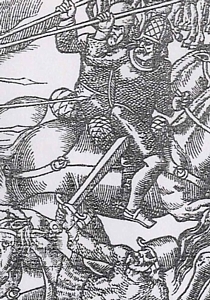HI7014 War and Society in Early Modern Ireland and Europe

Module Coordinator: Professor Micheál Ó Siochrú
Duration: Michaelmas Term
Contact Hours: 2 hours per week
ECTS: 10
Assessment: Students will complete the equivalent of two essays of c.3,500 words. The first essay or equivalent assignments will be preliminary work. The second essay will carry the mark for the module.
This module takes its impetus from the thesis that Early Modern Europe experienced a military revolution and considers the course of the Irish civil wars of the 1640s-50s in their broader British and European contexts. It examines the extent to which warfare served as an engine for political, religious, social and cultural change on a number of different levels. A particularly rewarding field for comparative study is the development of laws of warfare: regulations which show evidence of both shared origins and distinct local flavours. The module will draw on a variety of primary documents, visual, literary and historical, especially those housed in Trinity College Library. Students will be introduced to a number of online resources: most importantly, Early English Books Online, 1641 Depositions and the Down Survey of Ireland.
Learning Outcomes
On successful completion of this module students should be able to:
- identify key issues and developments relating to the Irish civil wars of the 1640s and 1650s, as revealed by in-depth analysis of relevant sources
- place this knowledge in the context of a broader knowledge and understanding of developments in Europe, including Britain
- formulate research questions for the purposes of essay writing and oral presentations
- assess the concept of military revolution and the various historiographical approaches and methodologies applied to this area of Irish history
- engage critically and in-depth with primary texts and secondary literature
- complete an intensive, self-motivated study of a relevant historical problem, with high quality research organization and presentation

